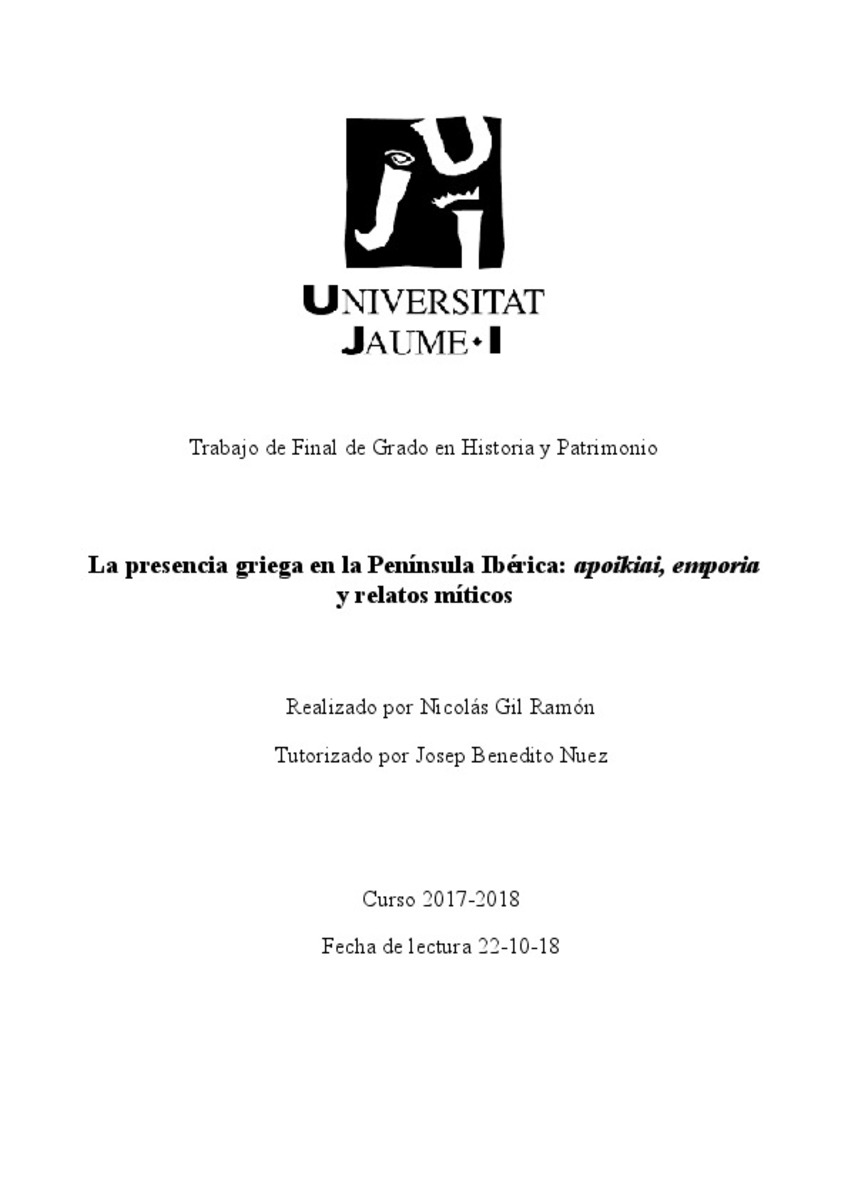Mostrar el registro sencillo del ítem
La presencia griega en la Península Ibérica: apoikiai, emporia y relatos míticos
| dc.contributor.author | Gil Ramón, Nicolás | |
| dc.contributor.other | Benedito Nuez, Josep | |
| dc.contributor.other | Universitat Jaume I. Departament d'Història, Geografia i Art | |
| dc.date.accessioned | 2019-02-14T10:58:40Z | |
| dc.date.available | 2019-02-14T10:58:40Z | |
| dc.date.issued | 2018-10-24 | |
| dc.identifier.uri | http://hdl.handle.net/10234/181099 | |
| dc.description | Treball Final de Grau en Història i Patrimoni. Codi: HP1036. Curs acadèmic: 2017/2018 | ca_CA |
| dc.description.abstract | En este trabajo se pretende estudiar las características de la presencia griega en la Península Ibérica en época Arcaica. Este proceso se inició por las dificultades de ciertas póleis griegas en el momento de frenar la amenaza externa de los persas o a consecuencia de problemas internos dentro de estas ciudades-estado, como fue la superpoblación o la mala distribución de las tierras. Asimismo resulta interesante analizar cómo se exportó el mismo modelo de polis griega a las nuevas fundaciones que se realizaron en el Lejano Occidente y, concretamente, en la Península Ibérica. Esta circunstancia se puede observar en Emporion, asentamiento que evolucionó de un establecimiento comercial o emporion a una ciudad-estado para acoger nuevos contingentes de población sin tierras o apoikia. Este expansionismo griego no sólo se manifiesta en los restos arqueológicos de Emporion o las noticias que aparecen en las fuentes griegas de posibles emporia griegos como Hemeroskopeion o Mainake sino también en los relatos míticos que hacen referencia a la Península al hallarse en una posición periférica del "mundo griego". De estas historias, en el TFG se hace referencia al viaje del navegante samio Coleo a Tartessos o el robo del ganado de Gerión en el décimo trabajo de Heracles en la isla de Eritría, la actual Cádiz, entre otros ejemplos. El relato de Coleo explica el interés comercial de los griegos por la Península Ibérica con Tartessos. El mito de Heracles vincula el establecimiento del fin del mundo habitado o oikoumene con el levantamiento de este héroe de las Columnas de Hércules. | ca_CA |
| dc.description.abstract | This work tries to study the characteristics of the greek presence in the Iberian Peninsula in Archaic era. This process starts for the difficulties of certain greek póleis had like the external threat of persians or internal problems like this cities-states, like the overpopulation or bad distribution of lands. Likewise, it is interesting analize how export the same model of greek polis was exported to the new fundations that was made in the Far Occident and, specifically, in the Iberian Peninsula. This circumstance can be seen in Emporion, settlement that developed from a comercial stablishment or emporion to a city-state to take in new contingents of population without lands or apoikia. This greek expansionship is not just manifested in the archeological rest of Emporion or the news that apperars in the greek sources of possible greek emporia like Hemeroskopeion or Mainake but also in the mythical stories that make reference to the Peninsula to be in a peripheral position of the "greek world". Of these stories, in the TFG it makes reference to the travel of samian sailor Colaeus to Tartessos or the theft of cattle of Gerion in the tenth work of Heracles in the island of Erytheia, nowadays Caddis, among other examples. The tale of Colaeus explains the commercial interest of the greeks in the Iberian Peninsula with Tartessos. The myth of Heracles links the establishment of the end of the inhabited world or oikoumene with the lift of this hero from the Pillars of Hercules. | ca_CA |
| dc.format.extent | 61 p. | ca_CA |
| dc.format.mimetype | application/pdf | ca_CA |
| dc.language.iso | spa | ca_CA |
| dc.publisher | Universitat Jaume I | ca_CA |
| dc.rights | Atribución-CompartirIgual 4.0 Internacional | * |
| dc.rights.uri | http://creativecommons.org/licenses/by-sa/4.0/ | * |
| dc.subject | Grau en Història i Patrimoni | ca_CA |
| dc.subject | Grado en Historia y Patrimonio | ca_CA |
| dc.subject | Bachelor's Degree in History and Heritage | ca_CA |
| dc.subject | presencia griega | ca_CA |
| dc.subject | Península Ibérica | ca_CA |
| dc.subject | mito | ca_CA |
| dc.subject | apoikia | ca_CA |
| dc.subject | Emporion | ca_CA |
| dc.subject | Greek presence | ca_CA |
| dc.subject | Iberian Peninsula | ca_CA |
| dc.subject | myth | ca_CA |
| dc.title | La presencia griega en la Península Ibérica: apoikiai, emporia y relatos míticos | ca_CA |
| dc.type | info:eu-repo/semantics/bachelorThesis | ca_CA |
| dc.educationLevel | Estudios de Grado | ca_CA |
| dc.rights.accessRights | info:eu-repo/semantics/openAccess | ca_CA |
Ficheros en el ítem
Este ítem aparece en la(s) siguiente(s) colección(ones)
-
Grau en Història i Patrimoni [178]
HP1036; HP1536








